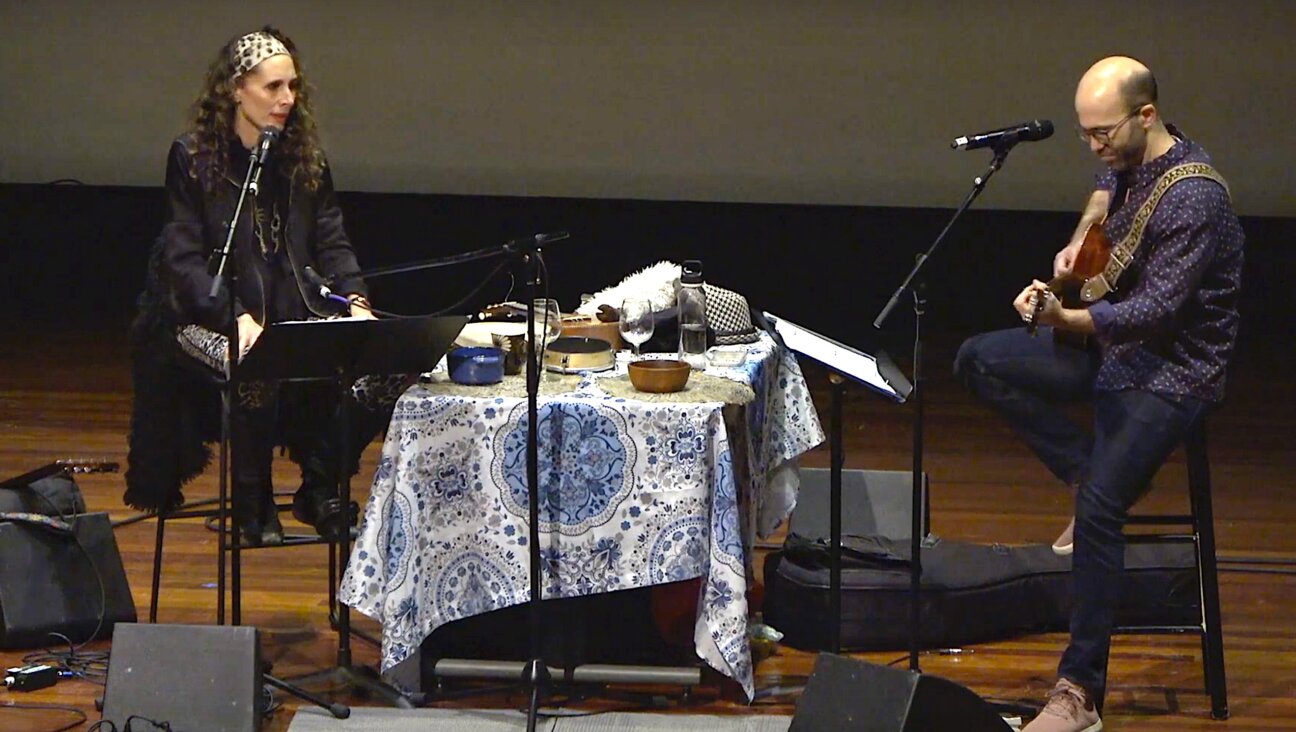Want to shmooze online in Yiddish? Lots of choices now!

Graphic by Angelie Zaslavsky
“Bist farshtumt.” (“You’re muted.”)
“Tsind on dayn mikrofon.” (“Turn on your microphone.”)
And of course: “Ot iz mayn kats. Zog: ‘sholem-aleykhem,’ ketsele!” (“Here’s my cat. Say hi, kitty!”)
If you’ve ever taken part in one of the various Yiddish shmueskrayzn (conversation groups) that have sprouted up on the Internet since the beginning of the pandemic, you’ll recognize these well-worn phrases. And as the pandemic stretches on, these chat groups show no sign of stopping soon.
But unlike the pandemic, the shmueskrayzn are a good thing. They have managed to connect Yiddish speakers around the world in a free, friendly exchange of chatter, ideas, and anecdotes, and remarkably, these participants don’t seem to tire of Zooming the way they did at the start of the pandemic, when some creative Yiddishist invented the word oysgezoomt, meaning “all Zoomed out” – one of the neologisms actually singled out by the American Dialect Society as one of the most interesting coinages of 2020.
Not all Yiddish chat groups are still active. Sandy Fox’s feminist Yiddish podcast, “Vaybertaytsh,” which attracted over 50 participants when it was launched in March 2020, was discontinued over the summer after Fox noted happily that there were many other Yiddish online events going on. Other groups are still meeting but are private, and not open to the Yiddish-speaking community at large. One of these is a lively Zoom led every other Sunday by Sabina Brukner for former campers and counselors of the former Bundist summer camp, Camp Hemshekh.
But here is a list of still-active, online chat groups, open to anyone, and led by Yiddishists on four different continents. Each of them is conducted in Yiddish only, is free of charge, and open to Yiddish speakers of every fluency level. See if there’s a group that appeals to you, where you can “khap a shmues” (join the conversation), and maybe even introduce the group to your adorable kitten, as seems to be the established custom.
The Yiddish World Zoomzitz (a play on the word “kumzitz,” a lively social gathering)
Who: Two Yiddishists in Johannesburg, South Africa, Arnold Garber and Eli Goldstein ([email protected])
When: One Sunday a month, 2 PM ET
Link to the Zoom Room: Click here
How Is This Zoom Different From All Other Zooms: “Probably the most creative name of all the groups, and possibly the most international membership (the time of the gathering is listed on its site in eight different time zones). Often, well-known guests from the Yiddish world are invited to take part, among them the director of Yung Yidish in Tel Aviv – Mendy Cahan, and the editor of the Forverts, Rukhl Schaechter.
Yiddish Connection
Who: The Paris Yiddish Center–Medem Library. Régine Nebel and Natalia Krynicka often lead the conversation.
When: The first Sunday of every month, 2 PM ET
Website: Click here
Link to the Zoom Room: Click here
How Is This Zoom Different: What a treat to hear Yiddish-speaking grandmothers with their silken French accents — and their cats! The atmosphere is warm and inviting, and participants are encouraged to join the conversation “mit a glezl in der hant!”, drink in hand.
Yiddish Our Language
Who: Eli Sharfstein, who was born in Vilna and now lives in Israel
When: Every Tuesday at 11 AM ET and every Thursday at 10 AM ET
Website: Click here
Link to the Zoom Room: Click here
How Is This Zoom Different: Every Tuesday, the group reads and discusses a Yiddish book or short story, and every Thursday, participants discuss selected topics. Past subjects included “Kids Ask Questions” and “How Is Yiddish Culture Being Preserved”. This is the only group that meets twice a week.
Yiddish Conversation Hour
Who: The Jewish Studies Program of Cornell University, with its Yiddish classes taught by David Forman ([email protected])
When: Every Friday, 12 PM ET
Website: Click here
Link to the Zoom Room: Click here
How Is This Zoom Different: Although the group is targeted to members of the Cornell community, guests from all over the world are welcome.
Queer Yiddishist Shmueskrayz
Who: The Facebook group, “Queer Yiddishkayt” and the Facebook page “Rad Yiddish”, led by freygl gertsovski (whose name is written in lowercase), Asa Brunet-Jailly and Sarah Schneider
When: The last-scheduled meeting took place last week, October 31 at 1 PM ET. The group’s administrators do not know yet when it will be meeting again, but as the last gathering attracted a sizable group of around 25 participants, it is likely that it will meet again. Those who are interested are invited to subscribe to the email list using the link below, in order to be updated on coming events.
Registration Form to Receive the Zoom Link: Click here
How Is This Zoom Different: For Yiddishists from the 2SIAQTBLG+ community and their friends. Conversation takes place in breakout rooms, according to level of Yiddish knowledge. The organizers encourage attendees to take part in the conversation with these words: “None of us are experts – and all of us are experts!”
Former conversation group, Yiddish House London, is planning a comeback:
Earlier in the pandemic period the organization, Yiddish House London, led a shmueskrayz that divided its participants into breakout rooms based on fluency level, and provided specialized activities and conversation topics for each.
Although the meetings were discontinued, founders Arturo Kerbel-Shein and Tamara Gleason Freidberg, a married couple of young Mexican Yiddishists currently living in London, recently received funding to restart the chat group and organize other activities through the Yiddish House London. Details to come on the organization’s Facebook page.























